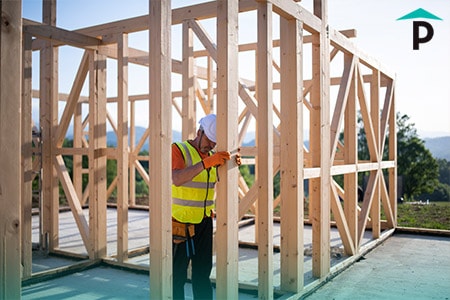A performance bond for a construction project (also known as a contract bond) essentially guarantees a contractor’s successful completion of a project. The bond protects the insured party in the event that a contractual entity fails to fulfill its responsibilities as stated in the contract between the insured and the contractor.
Call: (844) 612-7238 to get started
Quite frequently, the investor or owner may request a performance bond to ensure that the value of the work is not lost if anything unexpected occurs. Let’s look into this in more detail.
Contract Bonds For Construction
A contract bond for construction is a broad term that refers to the many bonds often required when contracting major municipal or private projects such as roads, buildings, or bridges. These surety bonds cover both the purchaser of the bond and the purchaser of the contract. Bonds for construction, ranging from bid bonds to maintenance bonds, are an essential element of the process of securing a major contract. Construction bonds are often needed for federal, state, and even municipal projects.
Because building projects are often larger, there is a greater risk of financial loss if anything goes wrong. These different construction bonds are intended to safeguard the project’s owners or investors against defective, incomplete, or fraudulent work performed by contractors. The bonds also show that the contractor has a good track record and enough financial resources for the project. It is very difficult to get a construction bond if the contractor has had numerous claims filed against bonds in the past. When a contractor bids on a project and has the necessary bonds, it demonstrates that a surety is ready to deal with them and is able to get the bonds they need to help expand their company. It is essential to get these bonds for construction.
Construction Contract Bonds
 The owner of a building under construction must be certain that the contractor will complete the job on schedule and within budget. Although no one can foresee such things with precision, construction contract bonds provided to the contractor by a corporate surety assist in putting the building owner’s mind at rest.
The owner of a building under construction must be certain that the contractor will complete the job on schedule and within budget. Although no one can foresee such things with precision, construction contract bonds provided to the contractor by a corporate surety assist in putting the building owner’s mind at rest.
When a bond is issued, the bonding firm is relying on the contractor to complete the work. Bond underwriters evaluate any contractor based on the “three Cs” – character, capability, and credit. All three are required for a successful contractor.
Character: The contractor must be trustworthy and have a high level of integrity.
Capability: To accomplish the task, the contractor must have the necessary expertise and knowledge.
Credit: In order to adequately finance the project, the contractor must have access to enough capital.
Contract Bonds
There are several different kinds of contract bonds that can be used in construction. The one you and your contractor choose will depend on the project at hand and what is required by the project manager. Here are some of the most usual types of contract bonds.
Bid Bonds
A bid bond is submitted by a contractor together with the bid on a specific project. Bid bonds ensure that if the project is granted, the contractor will sign the contract. It also ensures that the contractor will provide the required performance and payment bonds.
If the contractor fails to complete the work, the surety must pay the difference between this contractor’s bid and the next higher offer. The surety is only liable for the bond penalty (analogous to a limit of liability on an insurance policy). Suits against the surety have a six-month time limit under the bond.
Subdivision Bonds
A subdivision bond, also known as a developer, land improvement, site improvement, plat, completion, or performance bond, is a contract performance bond. Subdivision bonds ensure that improvements to land inside a subdivision will be undertaken.
Performance Bonds
If the principal pays the contractor, a performance bond ensures that the project will be completed according to contract requirements and lien-free. As a result, the owner must provide sufficient funds to finish the project. Before resorting to the surety, the owner must also challenge any liens on the project and estimate the amount of damage. Performance bonds can be required for many different projects.
Completion Bonds
Completion bonds are often required when a contractor obtains a loan to finish a construction project. A bond of this kind assures the lender that the project will be completed without any liens on the land.
Although the contractor’s performance bond and the completion bond may be provided by the same surety, this is not generally advised.

Payment Bonds
Payment bonds protect individuals who provide labor and supplies to a building project. It promises to compensate the owner for any losses incurred due to the principal’s failure to pay the suppliers.
The terms of a payment bond are often incorporated in the requirements of a performance bond. There is no fee for a payment bond if it is issued separately from a performance bond.
Permit Bonds
Permit bonds are bonds that some businesses need professionals to obtain in order to operate lawfully. This bond guarantees that the expert is competent for the task and will carry it out in line with all legal standards. Permit bonds are often sold by insurance firms and are sometimes referred to as license bonds.
Subcontractor Bonds
Subcontractor bonds are project-specific contracts between the general contractor, the subcontractor, and a surety firm (similar to an insurance company). It is usually stipulated in the building contract. The performance bond guarantees that the subcontractor’s work on the project will be completed. According to the agreement, if a subcontractor discovers that it is unable to finish a project, the surety business will either assist the subcontractor in completing the project or locate another company to do the job for them.
Lateral Support Bonds, Excavation Surety Bonds & Grading Permit Surety Bonds
Lateral support bonds are also known as excavation surety bonds and shoring bonds in certain jurisdictions. Lateral support bonds are often needed for sewage and sanitary construction, as well as in conjunction with other payment and performance obligations.
A grading bond is a kind of commercial surety bond that is often needed when a property owner, developer, or contractor seeks to acquire a grading and/or general construction permit and the quantity of earth moved exceeds a threshold established by the jurisdiction requesting the bond.
For more information on any of the permits and bonds mentioned above, please don’t hesitate to contact us for advice, information, and to set up your bonds as required. With our many years of experience, we can give you all the help you need.


